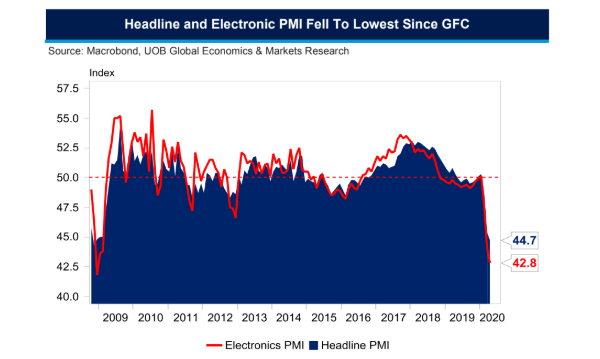
PMI dips further to 44.7 in April
This is said to be the lowest reading since 2008.
The Purchasing Managers’ Index (PMI) continues its downward spiral as it fell by 0.7 point to 44.7 in April from 45.4 in March, according to data from the Singapore Institute of Purchasing and Materials Management (SIPMM). This is the third month of contraction for the overall manufacturing sector, and the lowest recorded reading since November 2008 when the reading was 44.3.
It was dragged by faster declines in new orders, new exports, factory output and imports, whilst the indexes of finished goods, input prices, and order backlog also recorded slower contractions. SIPMM also noted that the imports index posted a faster contraction rate at 45.5, which is the lowest since October 2012 when the reading was similarly at 45.5.
“Anecdotal evidence suggests that many manufacturers were grappling with order cancellations resulting from the global containment measures of the COVID-19 pandemic,” SIPMM said. "The supply chain operating environment has also weakened considerably with the extension of our local circuit breaker measures that affect production capacity and responsiveness."
Similarly, the electronics sector’s PMI posted a decline of 1.3 points to 42.8 in April from 44.1 in March, which is also the lowest recorded reading since December 2008 at 41.8. There were also sharper contractions in new orders, new exports, factory output and imports. Key indexes of inventory, employment, supplier deliveries, finished goods, input prices, and order backlog recorded slower contractions.
However, the electronics factory output index hit 38.3, which is the lowest recorded reading ever since the PMI was launched in January 1999.
“Note both input prices and employment gauges have also slumped for both manufacturing (44.0 and 46.3) and electronics (43.4 and 44.2), which suggest caution is needed for the near-term outlook and also herald impending softness for the domestic labour market,” OCBC Investment Research (OIR) added.
However, the April PMIs have been consistent with the business expectations survey for the manufacturing sector, which pointed to 56% of firms anticipating a deterioration in the outlook for the next six months.
“Although Singapore’s industrial production grew by an unexpected 16.5% YoY in March, it was primarily led by a low base print in the previous year. We have also identified three observations that may inject further downside risks to Singapore’s manufacturing momentum. These include the volatile biomedical manufacturing cluster, lower oil prices, and the on-going supply chain disruption and negative demand shocks,” UOB’s economist Barnabas Gan stated.
Looking ahead, notes from OIR and UOB are expecting a weaker manufacturing outlook.
“Given that PMI readings usually lead manufacturing by two months at a correlation of 0.52, it is highly likely that Singapore’s industrial production may contract into the second and third quarter of this year. As such, we keep to our full-year outlook for industrial production to contract by 3.8% in 2020,” Gan said.
























 Advertise
Advertise









